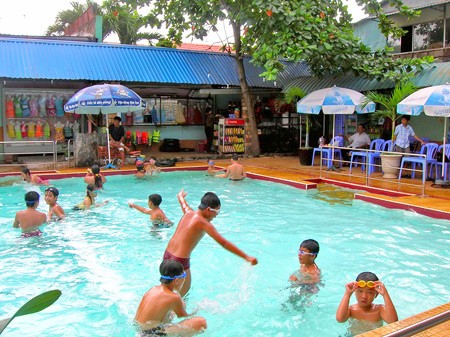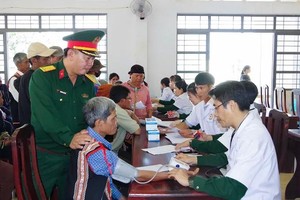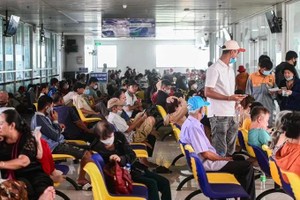During the recent hot, dry spell, many people have flocked to public swimming pools with their children to escape the heat. However, the Ho Chi Minh City Preventive Health Center warns that the risk of contracting illness or infection at some local pools is high.
Overloaded and under-chlorinated
Many swimming pools in HCMC are overloaded daily with masses of people looking to cool off. At around 3 pm each day, parents often take their children to Ky Dong pool in District 3, one of the city’s most popular pools.

Children swim at the Ky Dong pool in HCMC’s District 3. Due to a spike in the number of people visiting pools, the number of infectious diseases is on the rise. (Filed photo)
Other busy pools include Phu Tho in District 11, Yet Kieu in Binh Thanh District, Dai The Gioi in District 5, and Phu Lam in District 6.
With an average of 1,300-1,400 swimmers per day, most of whom are under 15, pool workers say it is difficult to adequately sanitize the water.
Dr. Hoang Thi Ngoc Tran from HCMC’s Preventive Health Center said the center monitored water safety and hygiene levels at 71 swimming pools in the city. Most showed substandard water quality, said Dr. Tran.
More than 20 swimming pools lacked chlorine to purify water and therefore, many types of bacteria are able to develop in swimming pools, said Dr. Tran.
Infections on the rise
Over the past few years, there has been a dramatic increase in the number of infections and infectious diseases attributed to swimming pools. Some strains of bacteria and viruses have built up resistance to chlorine while others are destroyed very slowly.
Doan Thu Trang from Thu Duc District said her daughter’s eyes were itchy and red for three days after swimming in a local pool. Although she bought eye drops for her daughter, her condition did not improve. Trang then brought her child to a doctor who said it was conjunctivitis, likely caused by bacteria from the swimming pool.
A doctor from the city’s Eye Hospital said the number of such patients had increased sharply over the past month, as more people had been swimming in pools due to the recent scorching weather.
Meanwhile, the city Dermatology and Venereology Hospital sees numerous patients with skin infections such as dermatitis and scabies. Many of the patients reported swimming in public pools during the past month.
Dr. Hoang Ngoc Ngan said that when pools are overcrowded, the level of contaminants entering the water also increases.
As such, more illnesses can be contracted including diarrhea, Dr.Ngan said.
She advises wearing swimming goggles and caps to help avoid ear and eye infections. People should also shower with soap and shampoo, and use disinfectant eye drops after swimming, she said.
The city Preventive Health Center has now asked pool managers to ensure standard levels of water safety and hygiene are being maintained.
























